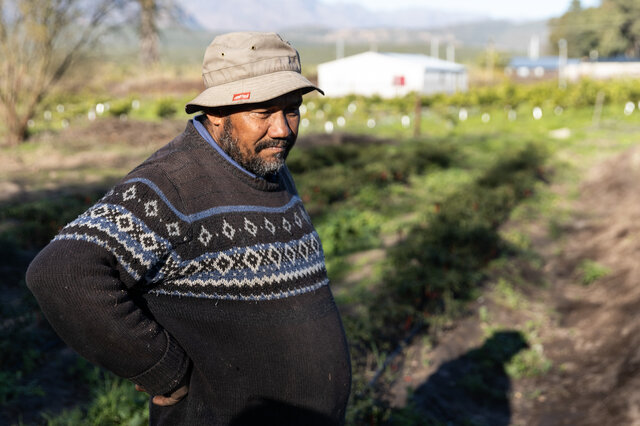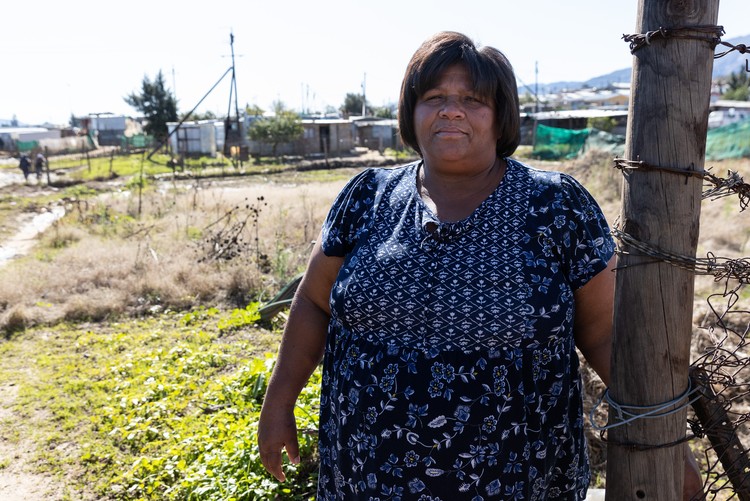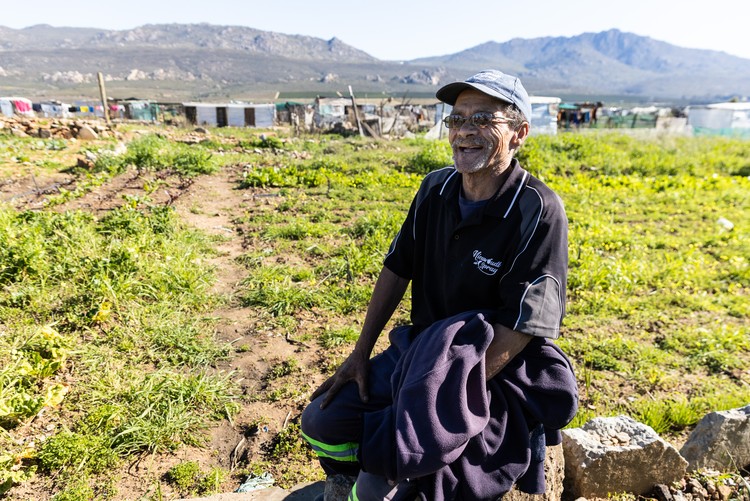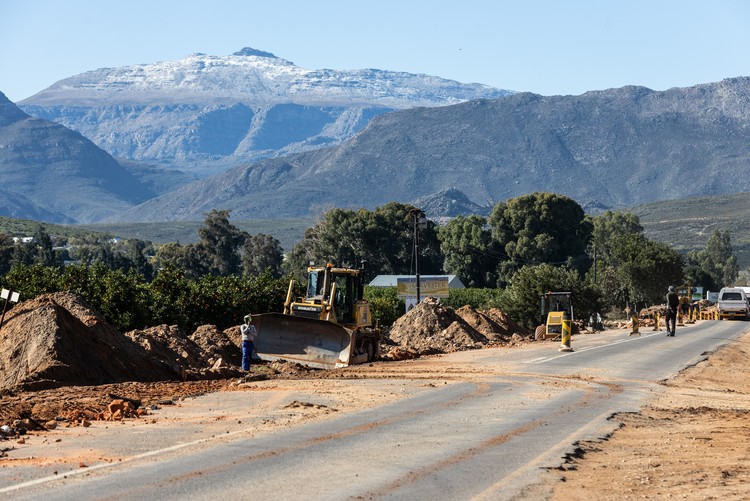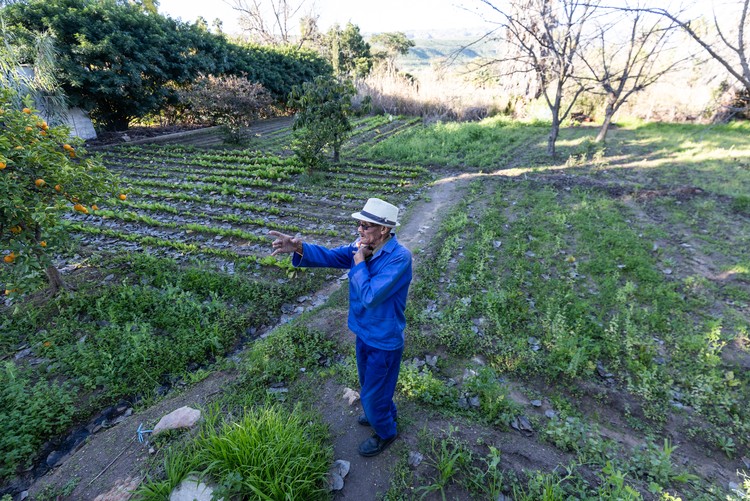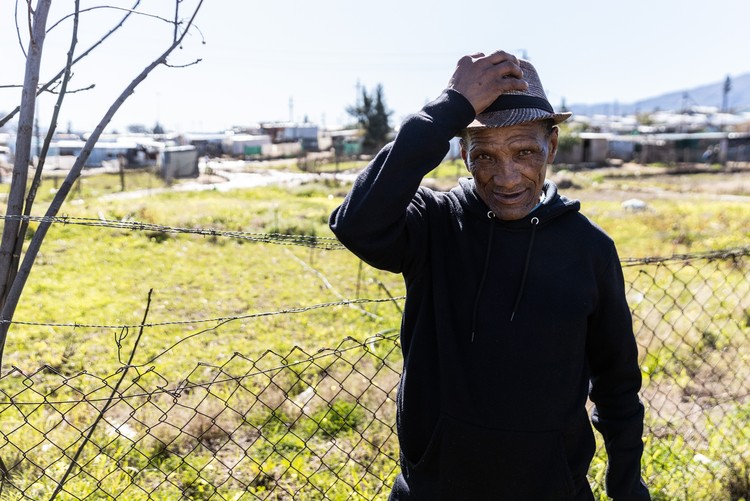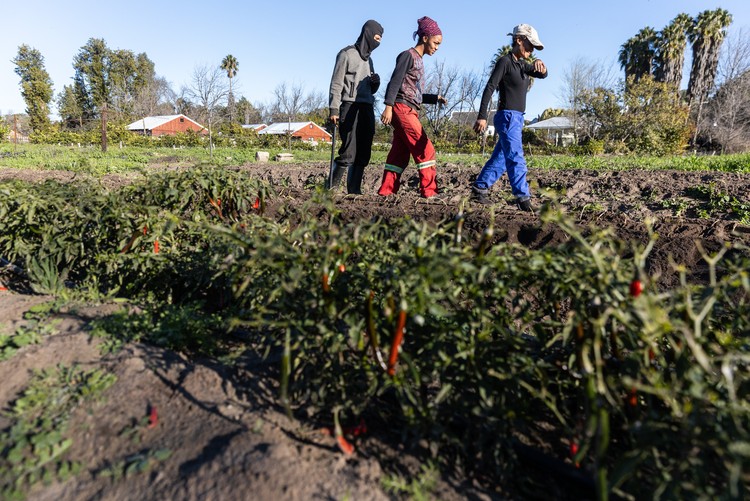Farmer Trevor Ludick from Clanwilliam says he loves what he does and enjoys the silence when he is working alone on his farm. But he is worried that this winter’s heavy rains will be repeated next year. Photos by Ashraf Hendricks.
Provincial department wants the area to be declared a disaster zone
By Liezl Human
21 July 2023
- Small-scale farmers in the Cederberg are battling to rebuild their livelihoods after floods devastated their crops last month.
- The provincial department of agriculture estimates the financial cost of the damages to be more than R1-billion.
- The department is now approaching the National Disaster Management Centre to declare a disaster area.
Small-scale farmers in the mountainous Cederberg region in the Western Cape are battling to put food on the table after floods wrecked their crops last month. The last floods of this magnitude occurred almost 40 years ago, according to long-time residents.
The Western Cape Department of Agriculture estimates that damage to agriculture and infrastructure in the province, totals a “conservative” R1.05-billion, according to a recent statement by MEC Ivan Meyer.
Without the vegetable gardens there is not enough food to feed the family, says farmer Janelle Simons from Citrusdal.
Nearly a month after the heavy rain, Janelle Simons led us towards her vegetable garden opposite the road where she lives in Oranjeville, Citrusdal. Nearly ten people farm on this large piece of municipal land. They feed their families first and sell or give away what is left. But much of their vegetable crop washed away during the floods and now the ground is too wet and muddy to plant anything.
Simons said the whole piece of land used to be filled with crops. “Everything was prepared and planted, and then the flood came… You can see it’s still wet… Last week there were a few dry days. We had to take out the plants that drowned,” she said.
“We are struggling. Every week I would’ve fetched something from this garden. Now there is nothing.”
Simons usually grows spinach, onion, cauliflower, cabbage, beet, and carrots but now “you can’t put anything in the ground”. “And I don’t know when we will be able to put things in the ground,” she said.
Willem Klaasen’s land was badly flooded.
Willem Klaasen, 63, took us to the nearby piece of land that he works on every day, from early in the morning. The land is near the river and the water flooded his crops.
He said that his onions started rotting and he had to throw them out. The ground is still too wet for planting, he said.
The worst of the storm about a month ago also caused the Citrusdal main road to collapse, cutting the town off for over a week.
Now the farmers are worried that the floods may be repeated in future.
In June, heavy rains collapsed the main road leading into Citrusdal. The road has since been repaired.
In Clanwilliam, about 60km north of Citrusdal, Trevor Ludick’s crops were ruined by the floods. He worries about the years to come. “Everything has halted. I can’t continue now because of the water. It could be like this next year too. This could be the first year only. I don’t want to plant stuff that will be destroyed again,” he said.
It took about two weeks for the water levels to drop low enough for him to walk or drive onto his farm. He had planned on expanding but then the storm hit. “So I wondered what I could do now. Possibly something that grows in water?”
When GroundUp visited, five workers were busy preparing onion seedlings on the higher ground which wasn’t affected by the flooding. Ludick usually employs up to ten people on his farm.
It doesn’t help to dwell on the negative, he says. “You put it away and forget about it. You move on,” he said.
Near Ludick’s farm, 69 year-old Abraham Hendricks works on two pieces of land hit by the rain and cold this winter.
Some of his crops were ruined by the heavy rains and the ground is still wet.
Abraham Hendricks says the cold winter has been hard on his crops and also on him.
This winter has been worse than usual, said Hendricks, who has been farming for most of his life. “You can make a life from this, but you can’t do anything if you don’t have help,” he said.
In Graafwater, a small town near Clanwilliam, Wasiela Douries farms primarily with chickens and pigs. She also works for an advice office called the Sandveld Local Development Agency (SALDA) which helps local people with economic development, agricultural development, rights issues, and recently, also climate change awareness.
Douries said eight livestock farmers had their kraals damaged. “It’s very difficult because we didn’t predict it this year. Usually we sit with droughts. Last year we didn’t get rain at all – and this year we got more than we bargained for,” she said.
Citrusdal farmer Lawrence Jonas feeds his family from the gardens and gives the rest of the crop to soup kitchens in the area.
The provincial department of agriculture has asked the provincial cabinet’s support to declare three Western Cape districts disaster areas.
This would allow for funds to be reprioritised and funding to be requested from National Disaster Management through the Department of Agriculture, Land Reform and Rural Development, said Jody Wenzel, manager of Disaster Risk Reduction at the provincial department. He said any funds would benefit all the farmers affected.
Small farmers in Clanwilliam work the land after heavy rains. Some fear the floods of this winter may be repeated in future.
The department also noted the importance of climate resilience. Wenzel said that for the past seven years they’ve provided drought support to affected farmers on the West Coast.
“Additionally, the Department has been engaging with the Cederberg farmers around climate change and disaster risk-reduction and mitigation measures. The climate change aspect of these engagements are critical as small-scale farmers are able to implement strategies which ultimately build resilience within the agricultural sector,” said Wenzel.
Douries also does climate change training once or twice a year. “Very few people know what it is. That’s what we’re here for. To make the people aware that climate change is here to stay and what they have to do to combat it. We’re also learning ourselves. And we come back to our community and teach it to our community.”
© 2023 GroundUp. This article is licensed under a Creative Commons Attribution-NoDerivatives 4.0 International Licence.
Follow African Insider on Facebook, Twitter and Instagram
Source: GroundUp
Picture: GroundUp
For more African news, visit Africaninsider.com

